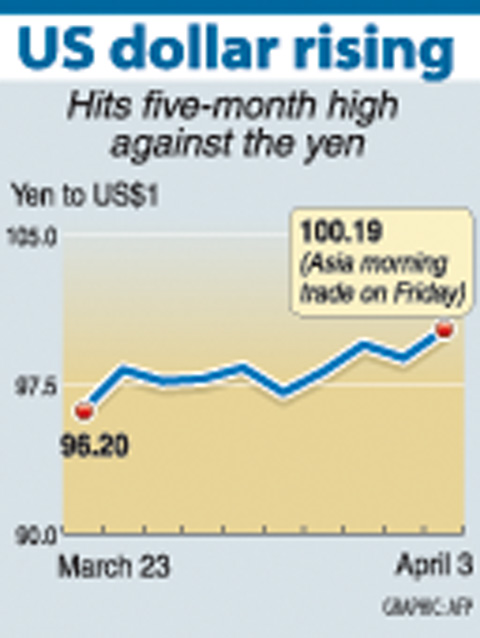The dollar topped ¥100 for the first time in five months but weakened against other major currencies on Friday as traders assessed the impact of a weak US employment on economic recovery prospects.
At 9pm GMT, the euro fetched US$1.3483 from US$1.3461 late on Thursday in New York.
The dollar meanwhile rose to ¥100.29 from ¥99.52 as investors welcomed the G20 summit pledge to step up efforts to tackle the economic crisis.

“The actions by Washington and leaders of the 20 largest economies have helped to restore risk appetite,” Kathy Lien at Global Forex Trading said.
In late New York trading, the dollar stood at 1.1301 Swiss francs from SF1.1340 on Thursday.
The pound was at US$1.4836 after US$1.4725.
Asian currencies rose for a fifth week, the longest winning streak since October 2007 in the wake of the G20 summit.
Eight of the 10 most active Asian currencies outside Japan advanced in the week after economic reports in China, the US and the UK fueled speculation that demand for regional exports will strengthen.
The Bloomberg-JPMorgan Asia Dollar Index, which tracks their performance, touched a two-month high on Thursday.
The South Korean won advanced 0.6 percent this week to 1,341.50 per dollar, according to data compiled by Bloomberg. The New Taiwan dollar climbed 1.2 percent to NT$33.38 and the Malaysian ringgit strengthened 1 percent to 3.5803.
The MSCI Asia-Pacific Index of regional equities climbed 1.4 percent during the week.
The NT dollar touched an 11-week high on Thursday before paring its advance on reported intervention. The central bank bought at least US$1.2 billion of US dollars on Thursday to counter foreign investors’ and local corporations’ purchases of the Taiwanese currency, the Taipei-based Economic Daily News said on Friday.
Elsewhere, the Singapore dollar climbed 0.6 percent this week to S$1.5051, Indonesia’s rupiah rose 0.2 percent to 11,475 and the Philippine peso gained 0.4 percent to 47.862.

AIR SUPPORT: The Ministry of National Defense thanked the US for the delivery, adding that it was an indicator of the White House’s commitment to the Taiwan Relations Act Deputy Minister of National Defense Po Horng-huei (柏鴻輝) and Representative to the US Alexander Yui on Friday attended a delivery ceremony for the first of Taiwan’s long-awaited 66 F-16C/D Block 70 jets at a Lockheed Martin Corp factory in Greenville, South Carolina. “We are so proud to be the global home of the F-16 and to support Taiwan’s air defense capabilities,” US Representative William Timmons wrote on X, alongside a photograph of Taiwanese and US officials at the event. The F-16C/D Block 70 jets Taiwan ordered have the same capabilities as aircraft that had been upgraded to F-16Vs. The batch of Lockheed Martin

US President Donald Trump yesterday announced sweeping "reciprocal tariffs" on US trading partners, including a 32 percent tax on goods from Taiwan that is set to take effect on Wednesday. At a Rose Garden event, Trump declared a 10 percent baseline tax on imports from all countries, with the White House saying it would take effect on Saturday. Countries with larger trade surpluses with the US would face higher duties beginning on Wednesday, including Taiwan (32 percent), China (34 percent), Japan (24 percent), South Korea (25 percent), Vietnam (46 percent) and Thailand (36 percent). Canada and Mexico, the two largest US trading

GRIDLOCK: The National Fire Agency’s Special Search and Rescue team is on standby to travel to the countries to help out with the rescue effort A powerful earthquake rocked Myanmar and neighboring Thailand yesterday, killing at least three people in Bangkok and burying dozens when a high-rise building under construction collapsed. Footage shared on social media from Myanmar’s second-largest city showed widespread destruction, raising fears that many were trapped under the rubble or killed. The magnitude 7.7 earthquake, with an epicenter near Mandalay in Myanmar, struck at midday and was followed by a strong magnitude 6.4 aftershock. The extent of death, injury and destruction — especially in Myanmar, which is embroiled in a civil war and where information is tightly controlled at the best of times —

China's military today said it began joint army, navy and rocket force exercises around Taiwan to "serve as a stern warning and powerful deterrent against Taiwanese independence," calling President William Lai (賴清德) a "parasite." The exercises come after Lai called Beijing a "foreign hostile force" last month. More than 10 Chinese military ships approached close to Taiwan's 24 nautical mile (44.4km) contiguous zone this morning and Taiwan sent its own warships to respond, two senior Taiwanese officials said. Taiwan has not yet detected any live fire by the Chinese military so far, one of the officials said. The drills took place after US Secretary